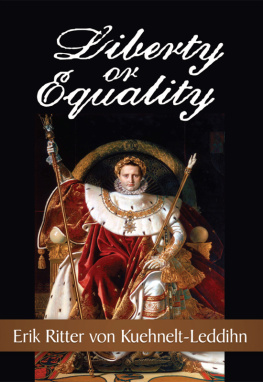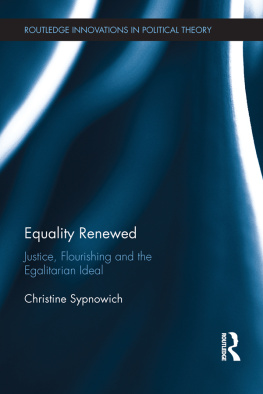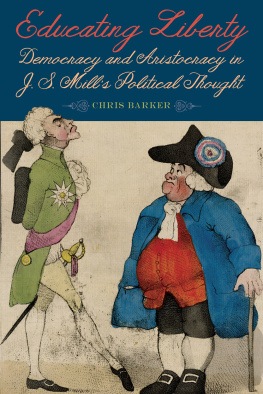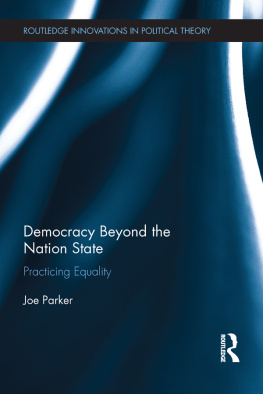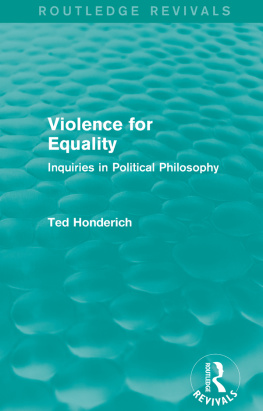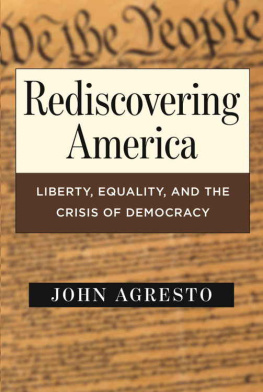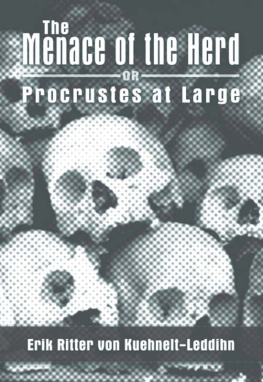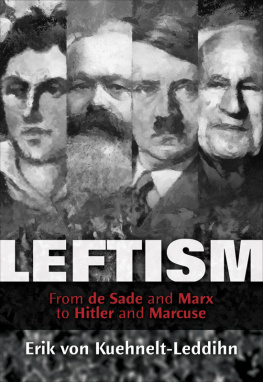LIBERTY OR EQUALITY
Other books in English by the same author:
Novels:
GATES OF HELL
NIGHT OVER THE EAST
MOSCOW 1979
BLACK BANNERS
Socio-political work:
THE MENACE OF THE HERD
(under pseudonym Francis S. Campbell)
LIBERTY
OR
EQUALITY
The Challenge of our Time
By
Erik von Kuehnelt-Leddihn
Edited by
JOHN P. HUGHES
1952

THE CAXTON PRINTERS, LTD.
CALDWELL, IDAHO

ALL RIGHTS OF REPRODUCTION RESERVED
MADE AND PRINTED IN GREAT BRITAIN
AT THE CHAPEL RIVER PRESS
ANDOVER, HANTS
10.51
To my friends and former students at
Chestnut Hill College, Philadelphia
ACKNOWLEDGMENTS
The author wishes to express his thanks to a number of American publishers and copyright holders who permitted him to quote from these various books:
The Atlantic Monthly Press: The Letters of William James, edited by H. P. Bowditch.
Messrs. Brandt and Brandt: The Letters of Franklin K. Lane, edited by A. W. Lane and L. H. Hall (Houghton Mifflin Company, 1922).
Harcourt, Brace and Company, Incorporated: Gustav Stolper, This Age of Fable (Reynal and Hitchcock, New York, 1942).
Harper and Brothers: Count Herman Keyserling, America Set Free; D. W. Brogan, France Under the Republic.
The Harvard University Press: The Holmes-Pollock Letters (Volume II) edited by Mark DeWolfe Howe.
The Houghton Mifflin Company: Henry Adams and His Friends, compiled by H. D. Cater; Letters of Henry Adams, edited by Chauncey Ford Worthington; Henry Adams, The Formative Years, edited by Herbert Agar.
Alfred A. Knopf, Incorporated: J. Fenimore Cooper, The American Democrat; Peter Viereck, MetapoliticsFrom the Romantics to Hitler; D. W. Brogan, The American Character; Gilberto Freyre, The Masters and the Slaves, translated by S. Putnam; Maurice Baring, Have You Anything to Declare?
Little, Brown and Company: Ogden Nash, Im a Stranger Here Myself.
Longmans, Green and Company: Josef Bernhart, The Vatican as a World Power, translated by George N. Shuster; W. E. H. Lecky, Democracy and Liberty.
The Macmillan Company: E. A. Robinson, Collected Poems; Henry Adams, The Tendency of History; Karl Adam, The Spirit of Catholicism, translated by Dom J. McCann.
William Morrow and Company, Incorporated: Albert Jay Nock, Our Enemy, The State.
Sheed and Ward, Incorporated: Nicholas Berdyaev, The End of Our Times, translated by Donald Attwater.
The University of Chicago Press: Euclides da Cunha, Rebellion in the Backlands, translated by S. Putnam; Donald Pierson, Negroes in Brazil: A Study of Race Contact in Bahia.
The Viking Press, Incorporated: The Portable James Joyce.
The Yale University Press: William Graham Sumner, The Challenge of Facts and Other Essays, edited by A. G. Keller.
W. W. Norton and Company: Everett Dean Martin, Liberty.
CONTENTS
MAPS AND DIAGRAMS
Figure
PREFACE
N OT without an inner emotion and a certain feeling of hesitancy am I offering these pages to the English-speaking public. The emotion is due to the fact that I lived for over ten years on the hospitable soil of the United States of Americathe native land of my second childwhich to me is my second home. The hesitancy, on the other hand, is the result of the grim foreboding that this volume will be the cause of several misunderstandings and, in a number of cases, of downright resentment. Yet, as Lon Bloy has insisted, it is later than we think, and the time for flattery, self-delusion and cheap optimism is over.
An involved situationa complicated problema complex issue cannot be dealt with in a few pages or in a simple way. This task has taxed the mental powers and the physical energies of more than one person; the author had to be assisted by an editor with a greater mastery of English than his own. Of course, as far as the material, the facts, and the views are concerned, these are entirely the authors responsibility.
The reader might conceivably ask himself why this book was written and published in this particular situation and at this particular time. Another edition, a German translation, will be published soon in Switzerland. But the author, an Austrian who will never forget his American decade, and his years in Britain, believes that directly as well as indirectly he has dealt with problems which not only lie at the core of that particular internal crisis which darkens the horizons of the Occidents future, but also form the very substance of the great and fatal misunderstanding between the Continent and the English-speaking nations.
This catastrophic lack of comprehension of the rather opaque world east of Calais, aggravated by confusion about technical terms, is largely responsible for the grave disappointments Americaand Britain alsohave suffered after each major war won for their ideals. Each triumph for democracy has ended, on the Continent, with a frightening set-back for the cause of liberty. The years 1917, 1918, 1922, 1933, 1938 were a chain of defeats for the cause of freedom. The Second World War resulted in military victory and political defeat.
In order to help Englishmen and Americans to distinguish more clearly between the forces of light and the forces of darkness the material for this book has been collected, arranged and annotated. It is our fervent hope that we have not altogether failed in this endeavour.
KUEHNELT-LEDDIHN
Lans,
Tyrol, June 28, 1951
CHAPTER I
DEFINITIONS AND BASIC PRINCIPLES
T HIS book is an essay in the narrowest sense of the terman effort to throw some light on certain phases and aspects of the century-old struggle between the principles of freedom and those of equality, between the ideologies of liberalism and of democracy (in their classic sense, of course). It is obvious that this study cannot be exhaustive; nevertheless, the subjects of our analysis have not been chosen at random, but have been selected for special reasons.
Before defining our terms we think it important to show our hand and to declare our philosophical baggage. It is obvious that any writer trying to analyze political or sociological phenomena critically and methodically will be motivated by a more or less coherent system of philosophy. Since the present author is a Catholic, his philosophy has an intimate relationship with the theology of his Churcha relationship which can best be defined as co-ordination. The principle that philosophy is the handmaid of theology has for him only a personal, but not an intellectual meaning. Although his philosophy is predominantly Thomistic, he is also deeply influenced by a theistic existentialism, and by certain cognitions of the phenomenological school. The Catholic reader who is curious as to the reasons which prompt him to deviate from Neo-Thomismtoday so strongly dominating the philosophical scene in Catholic North Americais invited to peruse the note on this subject on pages 164167.

